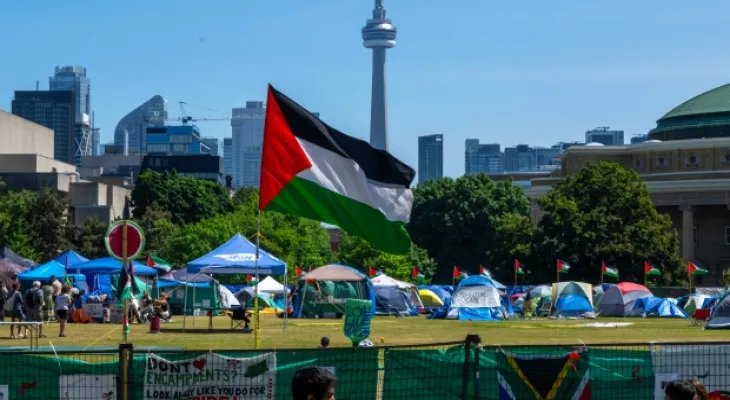Search here
Newspaper
Search here

Arab Canada News
News

Published: June 2, 2024
The celebrations for the graduates of the University of Toronto begin on Monday against the backdrop of a pro-Palestinian camp that has remained on campus for weeks despite eviction notices and looming legal action.
More than 30 celebrations are scheduled until June 21, and the university says all events will proceed as planned with "additional precautions."
The university sought to clear the camp before the prompt request for a court order that would allow police to take action to remove protesters who refuse to leave. However, the judge overseeing the case stated that the earliest hearing could be on June 19 and 20, to give the protesters a fair chance to respond.
This means that most graduates and their family members attending the ceremonies in the downtown campus are likely to pass by the fenced-in camp filled with tents, signs, and flags. The conference hall faces Kings College Circle, where the camp was established on May 2 after protesting students breached a temporary fence erected by the university around the large grassy area.
Among the exhibits and statements presented by the university to the court so far are communications from students and their family members who are concerned about the impact of the protest on the ceremony.
But protesters said they do not see how their presence will disrupt graduation events. Sarah Rasikh, the spokesperson for the camp, noted that the barriers have been present at Kings College Circle "for years" during graduation celebrations.
She said in an interview, "The only difference this time compared to last year is the presence of Palestinian flags on the fence," adding that many students in the camp are among the graduates this month.
Rasikh stated, "Graduates should attend (the ceremony) if they want to, and we are not taking a public stance on that."
The university argues that the camp poses health and safety risks and has led to numerous reports of harassment, hate speech, anti-Semitic incidents, and violence – allegations denied by the protest organizers.
In court documents, the University of Toronto states that the increasing number of students, faculty, and others on campus during graduation celebrations "creates the possibility of continued verbal and physical harassment of community members by occupiers of the university and increases the likelihood of potential violent altercations."
Among the emails submitted to the court, one student wrote to the University of Toronto stating that they would not attend the graduation dinner at Hart House because “the campus is no longer a safe place for Jews.”
One parent of a graduating student wrote to ask if it was possible to move the graduation ceremony to "a safer location." The email mentioned that a family member planning to attend is a Holocaust survivor and that walking past the camp would be painful.
One parent wrote, "Please explain how the University of Toronto plans to ensure a safe and meaningful graduation ceremony."
How does (the university) plan to ensure the safety of all graduates and attendees? How does it plan to ensure that no political disturbances occur at the ceremony? We are very proud of our daughter and simply want the celebration to be free of any obstacles."
The University of Toronto stated that it takes the safety of graduating students and their guests “very seriously” and has a “robust” process for dealing with event disturbances.
It wrote in a statement to The Canadian: "This year, we are taking additional precautions to ensure a safe and festive environment, including requiring graduating students to show their IDs when picking up their gowns and placing restrictions on bags and personal items brought to the conference hall."
The university's court filings also include some emails it received in support of the camp, including a memo from a student registered to graduate this month urging the administration to listen to the protesters' demands and avoid using police force to evict the camp.
The student wrote, "If it is not possible to guarantee a safe meeting due to the unintended consequences of the protest, I would prefer to cancel my graduation rather than see other students arrested and treated brutally."
Protesters said they will remain in the camp until the university meets their demands, which include disclosing investments in companies benefiting from the Israeli attack on Gaza.
Similar camps have emerged on campuses across Canada in recent months, as many schools study or take legal action against the protesters.
A camp at McGill University has been in place for more than a month, forcing the administration to move graduation celebrations off-campus to the Bell Centre, home of the Montreal Canadiens.
McGill President Deep Saini expressed his frustration at the withdrawal of camp representatives from the recent meeting aimed at ending their protest.
Comments